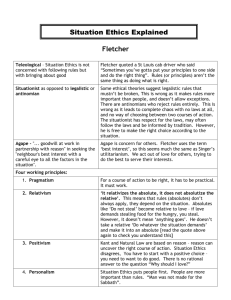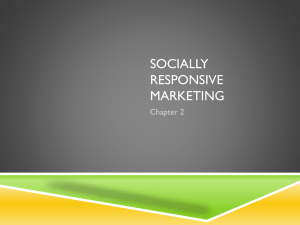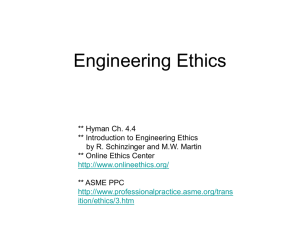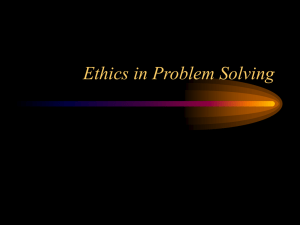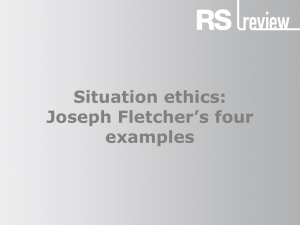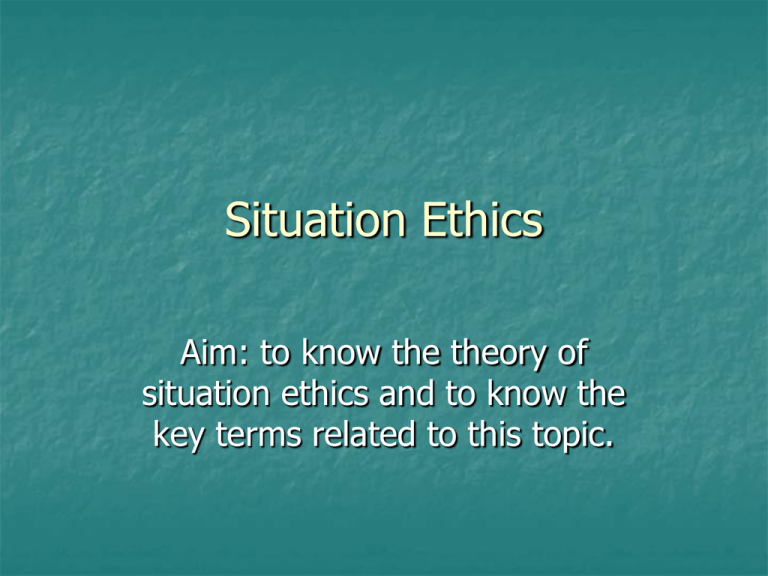
Situation Ethics
Aim: to know the theory of
situation ethics and to know the
key terms related to this topic.
“The morality of an action depends
on the situation”.
Joseph Fletcher (1963)
Key Questions
•What
does it mean for an action to be
loving?
•How might love be defined?
Key Questions
1.
2.
3.
4.
5.
Is moral behaviour about following rules or
working things out for ourselves?
Are there unbreakable laws to govern moral
behaviour, or should we make our own moral
decisions?
Is abortion for health reasons just as bad as
abortion for convenience?
Are there ever any situations when you should
ignore established moral rules?
When deciding what is right, should the
situation be taken into account?
Joseph Fletcher (1905-1991)
He was an American professor who
founded the theory of Situation ethics in
the 1960s.
He was a pioneer in bioethics and was
involved in the areas of abortion,
infanticide, euthanasia and cloning.
He was a priest who later renounced his
belief in God and became an atheist.
Task
A rich man asked a lovely young woman if she
would sleep the night with him. She said ‘No’.
He then asked if she would do it for £100 000.
She said ‘Yes!’
1.
Is it wrong to have sex for money:
a)
To survive?
b)
For luxury purchases?
c)
To fund a life-saving operation for a friend or
relative?
In each case, explain your answer.
2.
Why might your answers for a, b and c differ?
Key Terms
Agapé love
Antinomian ethics
Conscience
Four working
principles
Individualistic
Intrinsically good
justice
Law of love
Legalistic ethics
Personalism
Positivism
Pragmatism
Prescriptive
Proportionalism
Relativism
The Theory of Situation Ethics
1.
2.
3.
Fletcher maintains that there are
essentially three different ways of
making moral decisions.
Legalistic ethics
Antinomian ethics
Situation ethics
Legalistic Ethics
Has a set of moral rules and regulations.
Judaism and Christianity both have legalistic
ethical traditions.
Fletcher said this runs into problems – life’s
complexities require additional laws. Murder,
killing in self defence, killing in war, killing
unborn human beings etc.
Becomes complex and like a textbook morality
that leaves people simply to check the manual to
decide what is right and wrong.
Antinomian Ethics
The reverse of legalistic ethics.
It literally means ‘against law’.
A person using antinomianism doesn’t really
use an ethical system at all.
He or she enters decision-making as if each
occasion was totally unique. Making a moral
decision is a matter of spontaneity.
‘They are, exactly anarchic – i.e. without a rule’.
Fletcher is also critical of this approach.
Situation Ethics
One single rule – the rule of agape. This love is
not merely an emotion but involves doing what
is best for the other person, unconditionally.
Situation Ethics
The situationist enters into the moral
dilemma with the principles and rules of
his or her community.
However, they are prepared to set these
rules aside in the situation if LOVE seems
better served by doing so.
Situation Ethics
‘The situationist follows a moral law or violates it
according to love’s need’.
Fletcher
For the situationist, all moral decisions are
hypothetical. They depend on what best serves
love.
They don’t say that ‘giving to charity is a good
thing’. They only say that giving to charity is a
good thing if …’
Lying is justified if love is better served by it.
An insane murderer who asks you
the whereabouts of his next
victim…
Should be lied to! A situationist would
be able to do this.
In that situation, a legalist must tell the
truth.
Task
A teenage girl has become pregnant as a
result of being raped by a close family
member. She’s very poor and very young.
How would legalists, antinomians and
situationists go about considering what
the moral thing to do is?
Situation Ethics
1.
2.
Situation ethics is sensitive to variety and
complexity. It uses principles to
illuminate the situation, but not to direct
the action.
Fletcher divides his principles into two
categories:
The four working principles and
The six fundamental principles
The Four Working Principles and
the Six Fundamental Principles
Read the handout about the four working principles and
the six fundamental principles.
Put them into your own words.
Evaluating Situation Ethics
Strengths
Weaknesses

